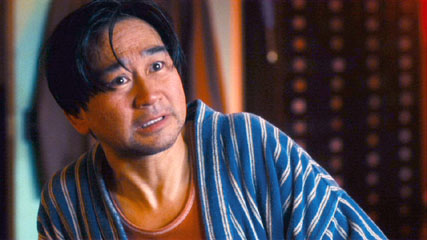|
Two thumbs about level! Neither of us has much bad to say about the film, and we were impressed with Jude Law, but we didn't find much to inspire us. Our basic reaction was, "Yawn." Scoop's comments in white: The first version of Alfie, made in 1966, made Michael Caine a star, and there is really nothing so bad about the 2004 remake. Jude Law distinguishes himself by bringing to the role more depth and sensitivity than were present in the original, and his conversations with the camera are natural and convincing. That stands as a strong positive for Jude, because having natural conversations with a camera is not an easy thing for an actor to do. In many ways, he did a better job than Michael Caine did in the original movie. The problem with the remake is that it is nothing special. You see, the first movie was a very special epiphany for many people at the time it was released. After the repressive 50s and before the cultural and feminist revolution of the late 60s, there was a brief period of male-dominated sexual liberation which was characterized by carefree hedonism. The symbols of this time were Frank Sinatra, John F. Kennedy, and Hugh Hefner, swingin' ring-a-ding guys who were out to score with the "broads" and "dames" of their time. Alfie came out with thinking that was nearly revolutionary in its day - that the self-gratifying Hefner-style hedonism might be bad for a man not because there was anything morally or theologically wrong with it, but because it was an empty and shallow lifestyle that was going to lead to loneliness. This was a new concept at the time, because the previous criticisms of that lifestyle had been concentrated on external other-directed and morality-driven rationale. "You shouldn't live like this because you are hurting other people," or "you are offending God," or "you are treating women like objects." Alfie, on the other hand, attacked the swinging Playboy lifestyle from a pragmatic standpoint. "You shouldn't live like this because in the long run you are hurting yourself." That made a lot of sense in the context of the time, because it lent perspective to a cultural trend which needed perspective. After decades of sexual repression, a lot of men, even very thoughtful men, saw Sinatra and Hefner as the prophets of a new age. After all, they were rebelling against a Puritanism that needed to be rebelled against, right? Alfie came along to say, "Yes, rebellion is necessary, and a new age is necessary, but this hedonism is only the first step, just the brief window of libertine behavior that always occurs whenever freedom replaces long-standing repression. We need to move on from here." And the movie's thinking was prescient. Society did move on from there. Within a year or two, the Summer of Love had happened, the cultural revolution had begun, and the sexual revolution had truly begun. Sinatra and Hefner, who had seemed like cultural prophets in 1963, suddenly seemed in 1968 like dinosaurs from a long-forgotten past. The problem with the remake is that all that cultural perspective is now lost. A story which once symbolized and summarized an entire time and place has now become just a story, nothing more. And it isn't even a very realistic story any more. In the early 60s, the choice between hedonism and restraint was simply an intellectual or ethical decision that tested one's capacity for long-term thinking. There was no AIDS. There was no feminism. Even herpes had yet to be mentioned outside of medical journals. In our time, it is much more difficult to be a hedonist. The decision to commit to a series of casual sexual encounters is no longer just a personal ethical choice. Even assuming you can find the women willing to co-operate in the first place, the choice can be a matter of life and death. Yet our Jude Law version of Alfie does not acknowledge the realities of sexual promiscuity in the 21st century. He simply romps about latter day New York as if he were Michael Caine getting some ring-a-ding in a 60s England which swung like a pendulum did. |
|
|
The new version of Alfie is not a bad movie, mind you. It has its moments. And you certainly have to respect any film that gives a decent-sized dramatic role to Long Duk Dong from Sixteen Candles. The Donger rules! (Picture to the right) You won't come out of the theater muttering about Alfie being shite, but it's just not special, and you might emerge from that theater wondering why they bothered making it in the first place
|
|

